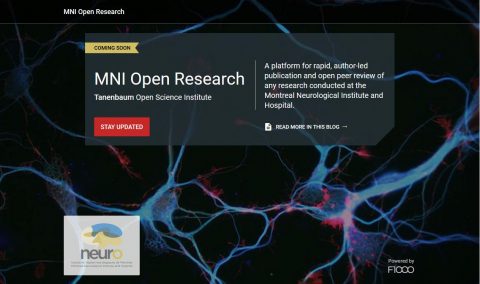With the publication of our first Registered Report, Hollydawn Murray, from F1000Research, explains how we hope this format will enhance credibility.
Chao Zhang was an author on a recent F1000Research that article looked into the options available to researchers for reusing data gathered from patients during clinical research. He outlines the several stages that are needed for these data to be accessed and reused.
We announce our partnership with the Montreal Neurological Institute and Hospital to launch MNI Open Research. Our Managing Director, Rebecca Lawrence, discusses how this open research platform will support their journey to become an open science institute
The Director of the Montreal Neurological Institute and Hospital, Guy Rouleau, talks about how launching the publication platform MNI Open Research will support their plans of becoming an open science institute.
We have launched Open Research Central, a new portal through which research in any field can be submitted for formal publication on one of the open research publishing platforms that we provide for funders and institutes. Through Open Research, we will grow a publishing model that truly focuses on serving the needs of authors and their research communities.
In June, a DNA analysis of over 200 ancient cat remains from Viking graves, Egyptian mummies and Stone Age Sites, revealed how the cat was domesticated and how it efficiently spread across the globe. This inspired us to paw through our recommended articles on the other findings made about felines based on their genetics. We also include our usual top 3 articles for the month and our Hidden Jewels.
Rosalind Smyth, Director of UCL Great Ormond Street Institute of Child Health, and Martin Elliott, UCL Professor of Cardiothoracic Surgery talk about the launch of the launch of the new publication platform UCL Child Health Open Research. It will be the first institute-focused publishing platform and allow any UCL Great Ormond Street ICH or other UCL researcher studying child health to publish with greater speed and transparency.
Throughout May, there were many discussions and reports about the current uses and future possibilities of artificial intelligence (AI), with AI and health care appearing to be a major theme. In recognition of this, we are highlighting the top 3 recommended articles in the area of AI in this month’s blog post, which we have decided to rename, and for those Transformers fans out there, you will see the link to this month’s theme. We also include our usual top 3 articles for the month and our Hidden Jewels.
A recent Opinion Article by Jan Voskuil, Aeonian Biotech, discussed the challenges in validation of research antibodies. It was openly peer reviewed by Michael Weller, Federal Institute for Materials Research and Testing (BAM), Germany. In this blog, both discuss these challenges, the reproducibility crisis and open data.
The Preclinlical Reproducibility and Robustness channel facilitates the open and transparent publication and discussion of confirmatory and non-confirmatory studies in biomedical research. Alongside our open data and method policies, this space was developed as part of our continued efforts to implement publishing practices which promote reproducibility. Leonard Freedman, President of GBSI, discusses the Reproducibility2020 initiative and offers some welcome optimism.














